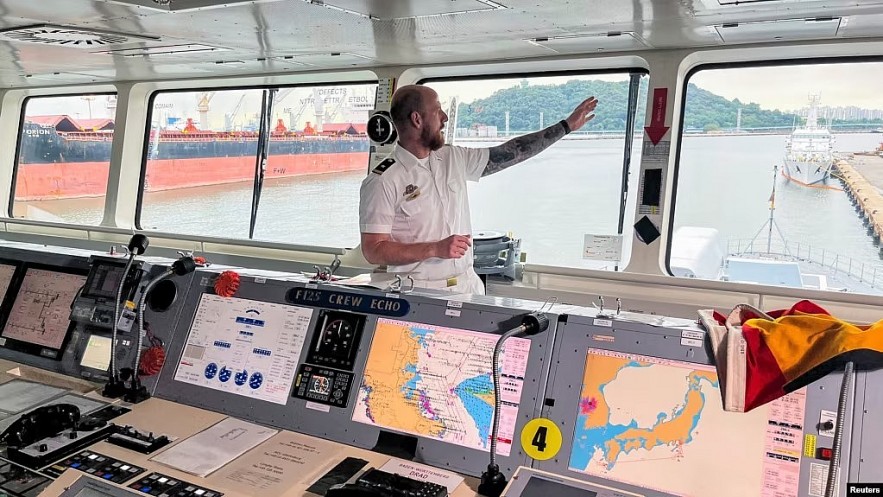Warships in South China Sea signal Germany's willingness to counter China's threats
 |
| FILE - A German naval officer stands on the bridge of the frigate FGS Baden-Wurttemberg, docked in Incheon, South Korea, Sept. 6, 2024. It is one of two German naval vessels en route from South Korea to the Philippines through the South China Sea. |
Two ships left the South Korean port city of Incheon on Tuesday bound for Manila, said the South Korean navy. They are expected to pass through the Taiwan Strait, according to Reuters, before the ships dock in Manila.
A spokesperson for the German Defense Ministry told VOA on Friday confirming that "the next port of call will be Manila, where the ships will moor September 16."
The spokesperson continued, "In accordance with the U.N. Convention on the Law of the Sea, but also for safety reasons, operational details such as the routes of our ships will not be announced in advance."
The navigation across the South China Sea would be the first such passage by German warships since the destroyer Bayern was deployed to the region from August 2021 to February 2022 in an exercise in defense of the freedom of navigation.
That time, the Bayern sailed from South Korea to Singapore but did not pass through the highly sensitive Taiwan Strait.
Rare passage
If a transit is made through the strait this time, it will be the first time that German warships have done so in 22 years.
China claims sovereignty over the islands and, while most countries regard the 177-kilometer-wide strait that separates it from the mainland to be international waters, Beijing opposes transits by military craft from other countries. The U.S. and other countries such as Canada have sent warships through the strait to exercise their rights under international law.
The navigation across the region is part of the Indo-Pacific Deployment (IPD) 2024, a set of multinational naval exercises and international operations that began in May and will last until December.
The German Navy called IPD "the most important" security operation this year in light of Russia's conflict in Ukraine, which has forced Berlin to reprioritize its defense strategies.
Daniel Kochis, a senior fellow at Hudson Institute's Center on Europe and Eurasia, said the significance of the transit "should not be understated" because it would demonstrate "German resolve in defense of freedom of navigation."
Increasing role
Berlin has stepped up its security role in the Indo-Pacific since a NATO summit held in July in Washington, where NATO countries and their Indo-Pacific partners of Australia, Japan, New Zealand and South Korea agreed to boost cooperation.
Shortly after the summit, Germany joined the Japanese Air Self-Defense Force in conducting joint aerial drills around Chitose Air Base on the Japanese main island of Hokkaido.
Recommended
 World
World
Pakistan NCRC report explores emerging child rights issues
 World
World
"India has right to defend herself against terror," says German Foreign Minister, endorses Op Sindoor
 World
World
‘We stand with India’: Japan, UAE back New Delhi over its global outreach against terror
 World
World
'Action Was Entirely Justifiable': Former US NSA John Bolton Backs India's Right After Pahalgam Attack
Popular article
 World
World
US, China Conclude Trade Talks with Positive Outcome
 World
World
Nifty, Sensex jumped more than 2% in opening as India-Pakistan tensions ease
 World
World
Easing of US-China Tariffs: Markets React Positively, Experts Remain Cautious
 World
World



